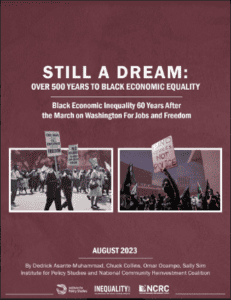“STILL A DREAM: Over 500 Years to Black Economic Equality”

Sixty years after Dr. Martin Luther King, Jr. gave his iconic “I Have a Dream” speech at the March on Washington for Jobs and Freedom, a new report lays bare the harsh reality of black economic inequality today in America. It reveals the sobering projection that without significant changes, it could take African Americans over 500 more years to achieve economic parity.
The report “STILL A DREAM: Over 500 Years to Black Economic Equality“ – co-authored by Dedrick Asante-Muhammad, Chuck Collins, Omar Ocampo, and Sally Sim and published by the Institute for Policy Studies (IPS) and National Community Reinvestment Coalition (NCRC) – highlights persisting disparities faced by Black Americans and the urgent need for action to address black economic inequality.
“Sixty years ago, Dr. King observed that America has defaulted on this promissory note to Black citizens,” said Chuck Collins, an IPS senior scholar in Washington, DC, where he directs the Program on Inequality and the Common Good. “Six decades later, despite incremental progress on some fronts, the check of opportunity has still come back with insufficient funds.”
“It is deeply troubling that, sixty years after the March on Washington for Jobs and Freedom, Black economic equality remains nothing more than a dream for most Black Americans,” said Dedrick Asante-Muhammad, Chief of Race, Wealth and Community for the NCRC. “The revelation that it would take more than 500 additional years to close the economic gap for Black Americans is a stark reminder of the systemic inequities that persist. We cannot stand idle in the face of such a glaring injustice. We must commit ourselves to dismantling these barriers and creating a society where everyone has equal economic opportunities.”
“The sobering projection and findings of our report sixty years after the March on Washington for Jobs and Freedom, reinforce that the dream for economic equality for Black Americans remains unfulfilled,” said Sally Sim, a senior organizer and project specialist at the NCRC. “On this historic anniversary, let us turn this report into a catalyst for meaningful action towards comprehensive solutions and public support for policies and initiatives that promote black economic equality. Now is the time to come together, challenge the status quo, and work towards an inclusive economy for all.”
“The findings of this report are sobering and demand immediate and comprehensive action to address the economic disparities faced by African Americans,” said Omar Ocampo, a researcher for the Program on Inequality and the Common Good at IPS. “We cannot ignore the fact that, sixty years after the March on Washington for Jobs and Freedom, black economic equality remains nothing more than a dream for most Black Americans. We must invest in transformative policies that address systemic racism and create an equitable society.”
KEY FINDINGS FROM THE REPORT:
- Despite some progress made by African Americans since the 1960s, including a decline in poverty rates, an increase in high school attainment, and lower unemployment rates, income disparity between African Americans and white Americans has only slightly improved.
- African Americans have 62 cents to the dollar of white family income in 2021, and at this rate, it would take 513 years to reach income parity. The wealth gap between Black and non-Black Americans has also only seen marginal growth, with African Americans having 18 cents for every dollar of non-Black wealth in 2019. It would take approximately 780 years for Black wealth to equal non-Black wealth at the current rate.
- African Americans have 62 cents to the dollar of white family income in 2021, (from 58 cents in 1967). At this rate, it would take 513 years to reach income parity.
- The wealth gap between Black and non-Black Americans has also only seen marginal growth, with African Americans having 18 cents for every dollar of non-Black wealth in 2019 (in 1962 African Americans had 12 cents for every dollar of wealth of non-Black Americans). At the current rate, it would take 780 years for Black wealth to equal non-Black wealth.
- Median household income for African Americans has grown just 0.36% since the turn of the century and is still lower today than white median family income in 1963.
- The Black-white homeownership divide remains unbridged after more than 60 years. Black homeownership increased from 38% in 1960 to 44% in 2021, a mere increase of six percent. In contrast, white homeownership increased from 64% in 1960 to 74% in 2021, a ten percent increase.
REPORT RECOMMENDATIONS:
- Advocate for full employment and guaranteed jobs to ensure economic opportunities for all.
- Implement a massive land and homeownership program to address the persistent homeownership gap between Black and white Americans.
- Commit to individual asset building, including financial education, asset matching programs, and supportive policies, to provide access to wealth-building opportunities for Black Americans.
- Enact policies to reduce dynastic concentrations of wealth and power, tackling the structural barriers that hinder economic progress for Black Americans.
- Explore targeted reparations as a means of rectifying historical injustices and providing meaningful redress for the economic disparities faced by Black Americans.
View the full report: https://ncrc.org/still-a-dream-over-500-years-to-black-economic-equality



